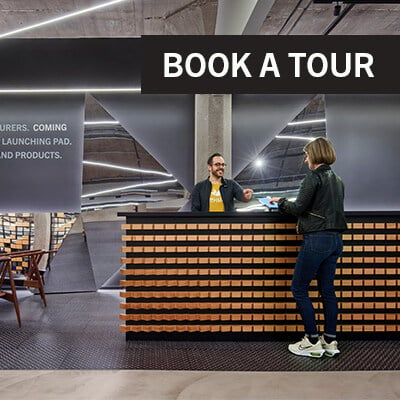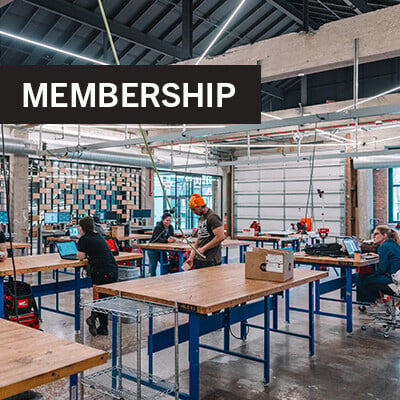6 Strategic Advantages of Building and Scaling a Manufacturing Company in Chicago and the Midwest
From startups to legacy industry, why manufacturing companies are choosing Chicago and the Midwest
Chicago has long been a powerhouse for industry, innovation, and economic opportunity. As one of the nation’s most historically significant manufacturing hubs, the Windy City continues to offer compelling advantages for entrepreneurs looking to build and scale manufacturing startups. However, beyond Chicago, the broader Midwest region also provides significant strategic advantages for manufacturers. From its prime location and robust infrastructure to a highly skilled workforce, innovation ecosystem, and strong business incentives, the Midwest serves as a critical foundation for growth and success in the manufacturing sector.
Here are 6 ways the Midwest supports manufacturing-based businesses and why new manufacturers might consider getting their start in Chicago:
-1.png?width=720&height=377&name=why_chicago-graphic2%20(1)-1.png)
Why the Midwest for Manufacturing
1. Prime Location and Logistics Hub
The Midwest’s geographical advantage is undeniable. As the nation’s industrial heartland, it serves as a crucial logistics hub, connecting businesses to national and international markets. Chicago, the region’s largest city, is home to one of the largest freight transportation networks in the U.S., including major interstates, rail lines, and O’Hare International Airport—one of the busiest cargo airports in the world. Illinois is the only state served by all seven Class I railroads, further enhancing its connectivity.
Beyond Chicago, major Midwest cities such as Detroit, Indianapolis, Columbus, and Milwaukee offer similar logistics advantages, with extensive highway networks, port access, and regional air freight facilities. For manufacturers, this means reduced transportation costs, faster supply chain operations, and seamless access to raw materials and distribution channels. The region’s ongoing investments in infrastructure continue to strengthen its role as a premier hub for transportation, distribution, and logistics.
-1.png?width=670&height=351&name=why_chicago-graphic2%20(4)-1.png)
2. Skilled Workforce and Educational Institutions
Manufacturing companies across the Midwest benefit from access to a deep talent pool. The region boasts a highly skilled workforce, supported by strong educational institutions such as Northwestern University, University of Illinois at Chicago, Purdue University, University of Michigan, and Ohio State University. These institutions collaborate with manufacturing firms to drive innovation and provide a steady pipeline of engineers, technicians, and skilled tradespeople.
The Midwest manufacturing workforce exceeds 2.5 million employees, with Illinois alone accounting for over 410,000 employees contributing to a $99 billion industry as of 2022. Across the region, thousands of students graduate annually with manufacturing or related degrees, and community colleges provide specialized training programs to develop technical skills. Additionally, the Midwest is home to over 60,000 manufacturing establishments, emphasizing its role as the country’s industrial backbone. The region’s manufacturing sector accounted for approximately $600 billion in Gross Regional Product (GRP), highlighting its national economic significance.
3. Business Incentives and Economic Support
The Midwest states, including Illinois, Indiana, Ohio, Michigan, and Wisconsin, offer numerous incentives to support manufacturing startups. These include tax credits, grants, and financing programs designed to reduce the financial burden on new and growing businesses. Programs such as the Illinois Economic Development for a Growing Economy (EDGE) tax credit, Indiana’s Manufacturing Readiness Grant, and Michigan’s Industry 4.0 Technology Implementation Grants provide financial benefits to companies investing in advanced manufacturing and green technologies.
Chicago’s network of business incubators and accelerators—such as mHUB—mirrors similar initiatives across the Midwest, including the Ohio Manufacturing Extension Partnership and the Indiana Economic Development Corporation. These resources create an ecosystem where manufacturers can innovate, collaborate, and expand efficiently.
4. Innovation and Industry Collaboration
The Midwest fosters a culture of innovation and cross-industry collaboration. With a growing number of advanced manufacturing firms, research institutions, and technology-driven startups, the region provides an ideal environment for companies looking to integrate cutting-edge technologies into their production processes.
.png?width=670&height=351&name=why_chicago-graphic2%20(5).png)
The Midwest is home to several innovation hubs that drive advancements in manufacturing. Examples include:
- mHUB (Chicago, IL): A leading innovation center for physical product development and manufacturing, offering entrepreneurs access to state-of-the-art prototyping labs, mentorship programs, and a vibrant community of innovators.
- Argonne National Laboratory (IL): A multidisciplinary science and engineering research center that plays a pivotal role in driving innovation within the manufacturing sector, focusing on materials science, energy storage, and advanced manufacturing processes.
- Purdue University Manufacturing Research Institute (IN): Focuses on automation, smart manufacturing, and next-generation materials for industrial applications (Purdue University 2023).
- Detroit Smart Manufacturing Initiative (MI): Drives innovation in automotive and industrial automation through partnerships with industry leaders and academic institutions.
The synergy among these institutions creates a robust ecosystem that offers several competitive advantages:
- Access to Cutting-Edge Research: Manufacturers can collaborate with these organizations to leverage the latest scientific discoveries and technological advancements, leading to improved products and processes.
- Talent Pipeline: The educational programs and training initiatives provided by these institutions ensure a continuous supply of highly skilled professionals ready to contribute to the manufacturing sector.
- Resource Sharing: Facilities like mHUB offer shared resources that lower the barrier to entry for startups and provide established companies with tools to innovate without significant capital investment.
- Economic Development Initiatives: Collaborative projects and state-supported programs drive economic growth, creating a favorable environment for manufacturing enterprises to thrive
-2.png?width=670&height=351&name=why_chicago-graphic2%20(3)-2.png)
Manufacturing companies in the Midwest benefit from a diverse economic landscape. The region’s economy spans multiple industries, including automotive, aerospace, food processing, healthcare, and industrial machinery. This diversity creates ample opportunities for manufacturers to serve various sectors, diversify revenue streams, and mitigate risks associated with industry downturns.
Additionally, the Midwest’s proximity to the nation’s agricultural and industrial heartland allows manufacturers to tap into a vast network of suppliers and customers. Whether producing specialized components or consumer goods, businesses have direct access to both B2B and B2C markets.
6. Commitment to Energy Resilience
As energy efficiency becomes a priority for businesses worldwide, the Midwest stands out as a leader in smart and sustainable manufacturing initiatives. States across the region have prioritized the adoption of green logistics, including the expansion of electric vehicle fleets and energy-efficient practices in warehousing and distribution. Programs like the Illinois Sustainable Technology Center (ISTC) and the Midwest Energy Efficiency Alliance support companies in implementing new production practices, reducing waste, and improving energy efficiency.
Why Chicago for Manufacturing-based Startups?
Thanks to its rich industrial history, strategic resources, and vibrant innovation ecosystem, Chicago is an interesting choice for startups building manufactured products. In addition to benefiting from the many Midwest advantages outlined above, the city provides a few additional incentives for startups specifically.
-2.png?width=670&height=351&name=why_chicago-graphic2%20(2)-2.png)
Chicago’s location within the Midwest and North America gives startups a strategic advantage in logistics, and with a rich legacy of industrial expertise, Chicago is ideal for businesses relying on transportation or manufacturing automation.
2. Growing Venture Capital Culture
Chicago continues to attract venture capital, launch new funds, and increase early-stage rounds. mHUB Ventures is one of the many firms looking to increase capital for startups working on deep or hardtech solutions that often have higher barriers to entry and fundraising.
3. Affordable Quality of Life
Chicago provides entrepreneurs with a high quality of life, offering affordable housing, cultural vibrancy, and world-class infrastructure. Living and operating costs are significantly lower than in other major hubs like New York or San Francisco, which is a plus for attracting talent.
Chicago, with its manufacturing roots, strategic location, innovative programs, and outstanding quality of life, positions itself as a premier destination for startups focused on manufactured products while the Midwest at large presents an ideal landscape for manufacturing companies looking to scale. Its strategic location, world-class logistics infrastructure, skilled workforce, economic incentives, and culture of innovation make it a top-tier choice for businesses in the manufacturing sector. By leveraging the region’s resources and dynamic ecosystem, manufacturers can position themselves for long-term success, efficiency, and growth.

References:
- BDO. “Illinois Updates: Credits & Incentives Programs.” BDO, https://www.bdo.com/insights/tax/illinois-updates-credits-incentives-programs
- BLS Strategies. “Illinois Incentives.” BLS Strategies, https://www.blsstrategies.com/incentives/illinois
- Chicago Metropolitan Agency for Planning. Industry Clusters. CMAP, https://cmap.illinois.gov/focus-areas/regional-economy/industry-clusters/
- Chicago Metropolitan Agency for Planning. Industry Clusters. CMAP, https://cmap.illinois.gov/focus-areas/regional-economy/industry-clusters/
- Chicago Metropolitan Agency for Planning. Manufacturing Cluster Drilldown Report. CMAP, https://cmap.illinois.gov/wp-content/uploads/FY13-0073-MANUFACTURING-CLUSTER-DRILLDOWN-FINAL.pdf
- City of Chicago. Chicago Sustainable Industries: CSI 2. City of Chicago, https://www.chicago.gov/content/dam/city/depts/zlup/Sustainable_Development/Publications/Chicago_Sustainable_Industries/CSI_2.pdf
- City of Chicago. State of the Economy: Chicago 2023. City of Chicago, https://www.chicago.gov/content/dam/city/depts/COFA/OtherReports/State-of-the-Economy-Chicago-2023.pdf
- Federal Reserve Bank of Chicago. Seventh District Year in Review 2023. Federal Reserve Bank of Chicago, https://www.chicagofed.org/publications/chicago-fed-insights/2024/seventh-district-year-in-review-2023
- Hancock, Robert. “Illinois Embraces Tech Boom with New Tax Incentives.” TaxPoint Advisors, 2024, https://taxpointadvisors.com/blog/view/illinois-embraces-tech-boom-with-new-tax-incentives
- Hypersense Software. “Illinois Manufacturing Growth Trends & Innovation 2023.” Hypersense Software, 1 Nov. 2023, https://hypersense-software.com/blog/2023/11/01/illinois-manufacturing-growth-trends-innovation-2023/
- Illinois Department of Commerce & Economic Opportunity. Enterprise Zone Program. Illinois Department of Commerce & Economic Opportunity, https://dceo.illinois.gov/expandrelocate/incentives/taxassistance/enterprisezone.html
- Illinois Department of Commerce & Economic Opportunity. Illinois 2024 Economic Growth Plan. Illinois Department of Commerce & Economic Opportunity, https://dceo.illinois.gov/content/dam/soi/en/web/dceo/documents/ilinois-2024-economic-growth-plan.pdf.
- Illinois Department of Commerce & Economic Opportunity. Incentives and Tax Credits. Illinois Department of Commerce & Economic Opportunity, https://dceo.illinois.gov/businesshelp/incentivesandtaxcredits.html.
- Illinois General Assembly. Annual Report: 2023. Illinois General Assembly, https://www.ilga.gov/reports/ReportsSubmitted/5070RSGAEmail10797RSGAAttach2023%20REV%20Annual%20Report.pdf
- Illinois General Assembly. EDGE Annual Report 2023. Illinois General Assembly, https://www.ilga.gov/reports/ReportsSubmitted/5071RSGAEmail10798RSGAAttach2023%20EDGE%20Annual%20Report.pdf
- Intersect Illinois. “Advanced Manufacturing.” Intersect Illinois, https://www.intersectillinois.org/key-industries/advanced-manufacturing/.
- Intersect Illinois. Resources: Incentives. Intersect Illinois, https://www.intersectillinois.org/resources/incentives/
- Matthews Real Estate Services. “2024 Industrial Market Reports.” Matthews Real Estate Services, 2025, https://www.matthews.com/2024-industrial-market-report-chicago-il/
- PitchBook Data, Inc. “PitchBook, 2023.” PitchBook Data, Inc., 2023, accessed 15 Jan. 2024. Data has not been reviewed by PitchBook analysts.
- Smith, Paige. “Illinois Tax Incentives for Your Business.” Gusto, 2024, https://gusto.com/resources/states/illinois/il-tax-incentives
- Southern Illinois Economic Development Authority. “Do Business Here: Tax Incentives.” Southern Illinois Economic Development Authority, https://southernillinoisnow.org/do-business-here/tax-incentives/
- Statista. “Real Value Added to the Gross Domestic Product of Illinois in the Industry.” Statista, 2024, https://www.statista.com/statistics/304912/illinois-real-gdp-by-industry/
- The Chicago Community Foundation. “Revitalizing Manufacturing: Expanding Opportunities for Chicago’s Black & Latino Communities.” The Chicago Community Foundation, https://tcf.org/content/report/revitalizing-manufacturing-expanding-opportunities-chicagos-black-latino-communities/.
- The Chicago Community Foundation. “Revitalizing Manufacturing: Expanding Opportunities for Chicago’s Black & Latino Communities.” The Chicago Community Foundation, https://tcf.org/content/report/revitalizing-manufacturing-expanding-opportunities-chicagos-black-latino-communities/
- U.S. Bureau of Labor Statistics. “Chicago Area Employment – November 2024.” U.S. Bureau of Labor Statistics, 2025, https://www.bls.gov/regions/midwest/news-release/areaemployment_chicago.htm
- World Business Chicago. “Chicago Business Bulletin Year in Review 2023.” World Business Chicago, accessed 14 Mar. 2025, https://worldbusinesschicago.com/app/uploads/2024/02/Year-in-Review-2023_-Chicago-Business-Bulletin.pdf
- World Business Chicago. “World Business Chicago Unveils New Research Report: Innovation in Manufacturing – Chicagoland's Advantages.” World Business Chicago, https://worldbusinesschicago.com/allnews/world-business-chicago-unveils-new-research-report-innovation-in-manufacturing-chicagolands-advantages/.
- World Business Chicago. “World Business Chicago Unveils New Research Report: Innovation in Manufacturing – Chicagoland's Advantages.” World Business Chicago, https://worldbusinesschicago.com/allnews/world-business-chicago-unveils-new-research-report-innovation-in-manufacturing-chicagolands-advantages/
- World Business Chicago. Innovation in Manufacturing: August 2023. World Business Chicago, https://worldbusinesschicago.com/app/uploads/2023/08/Innovation-in-Manufacturing_August-2023.pdf





